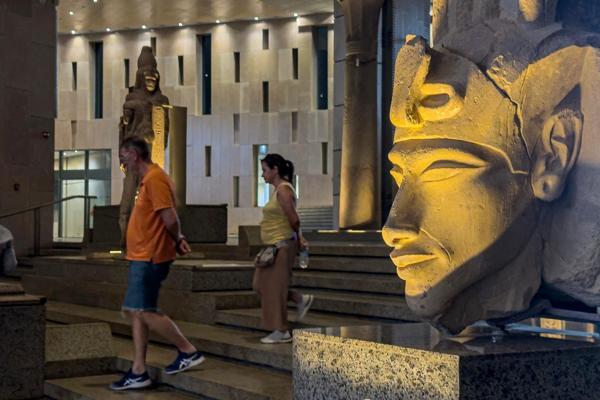Egypt's long-delayed mega-museum opens in a trial run
CAIRO


The Grand Egyptian Museum will open 12 halls with exhibits about ancient Egypt in its main galleries starting this week in a trial run ahead of the still-unannounced official opening, officials said on Oct. 15.
The museum, a mega-project near the famed Giza Pyramids which has cost well over $1 billion so far, will open the halls for 4,000 visitors per day starting on Oct. 16, said Al-Tayeb Abbas, assistant to the minister of antiquities.
The museum has been under construction for more than a decade, and an overall opening date has not yet been set, having been repeatedly delayed for various reasons, including the COVID-19 pandemic. Some sections have been open since 2022 for limited tours.
More than 100,000 artifacts of Egypt’s ancient treasures will be displayed in the world’s largest archaeological museum, according to the Egyptian state information website.
Abbas told the AP that the trial run would help prepare for the full opening by identifying operational issues, including which parts of the museum might become overcrowded.
The displays across the 12 halls tap into issues related to society, religion, and doctrine in ancient Egypt, he added. The open-style halls have been classified by dynasty and historical order and will showcase thousands of artifacts.
Eras that will be exhibited in the main galleries include the Third Intermediate Period (about 1070-664 B.C.), Late Period (664-332 B.C.), Graeco-Roman Period (332 B.C.-395 A.D.), New Kingdom (1550-1070 B.C.), Middle Kingdom (2030-1650 B.C.), and Old Kingdom (2649-2130 B.C.). One of the halls displays statues of “Elite of the King,” members of the royal family and high-ranking officials who worked in the army, priesthood, and the government.
Limited tours have been allowed in parts of the site since late 2022 to test visitors’ experience and the museum’s operational preparedness.
Aude Porcedde, a Canadian tourist who visited several sections, told the AP she was amazed by the museum, adding that Egyptian civilization is important for her and for the world to know more about.
“There is a lot of history and a lot of things we are not aware of, especially coming from the other side of the world, and seeing everything here and learning from the locals has been great,” said Costa Rican tourist Jorge Licano.
The grand staircase, six stories high and with a view of the pyramids, and the commercial area are open to the public, showcasing monuments and artifacts that include sarcophagi and statues. Other parts of the museum, including the King Tutankhamun treasure collection, are set to open at later dates.
All halls are equipped with advanced technology and feature multimedia presentations to explain the lives of the ancient Egyptians, including its kings, according to Eissa Zidan, director-general of preliminary restoration and antiquities transfer at the museum.
One of the halls will use virtual reality to explain the history of burial and its development throughout ancient Egypt.
“The museum is not only a place to display antiquities, but it also aims to attract children to learn about ancient Egyptian history... The museum is a gift to all the world,” Zidan told the AP.
